- Home
- Vicki Delany
More Than Sorrow Page 4
More Than Sorrow Read online
Page 4
“Like he’s gonna listen to me.”
“Tell him if he doesn’t listen to you, he’ll be listening to me. And he won’t like what he hears.”
Joanne turned her attention back to the frying pan. “Not very neighborly of me, is it? I never heard anything more about the student, so thought she’d gone home. Come to think of it, if she’s from Afghanistan she’s unlikely to be an exchange student, right?”
“Do you talk to your neighbors much?”
“The Harrisons? Just about never. They’re an older couple, moved in two years or so ago. I went over to introduce myself. They were friendly enough but didn’t return the gesture. I’ve invited them to farm things, like the seedling sale or the harvest party. She sometimes comes, but never her husband. She’s fairly active in the community, volunteers at the hospital, that sort of thing, but he’s somewhat reclusive. I tried telling them to keep that dog locked up. It’s as old as Methuselah, as deaf as the kitchen table. Shouldn’t be wandering the roads the way it does. Mr. Harrison politely told me to mind my own business.”
“You know Lily feeds the dog, right?”
“I suspected as much. She’d love to have a dog, but…” Joanne reached for a package of ground beef. “It’s not like I need someone else to look after.” She whirled around. “I didn’t mean…You’re welcome here as long as you…”
“I know.”
“Did it bother you? Seeing the woman?”
“Reminded me of things I’d prefer not to remember, that’s all.”
Joanne added beef to the sizzling frying pan. The scent of onions and garlic filled the kitchen. The TV had been switched off, and we could hear Lily crossing the floor above our heads. Outside, a group of finches, chests brilliant yellow in their spring mating plumage, circled around the feeders, jostling for space, pecking at tiny black seeds.
A loud knock sounded on the office door and a deep voice called, “Anyone home?”
“In the kitchen,” Joanne shouted.
Connor’s white T-shirt was streaked with dirt, as was his face. He wore a ball cap advertising a tractor company, and his curls were damp with sweat. “Just wanted to say bye.”
“How was your day?” Joanne asked. “Still think you want to be a farmer?”
“I might reconsider. “ His voice was light, teasing. “Darned hard work.”
“It is that,” Joanne said.
“Well, I’m off. See you all tomorrow.”
“Good night.”
He glanced at me, gave me a soft smile and a nod, and left.
I felt color rising in my face, nonplused and uncomfortable at the man’s attention. Without thinking I touched my head. My long red hair was gone, shaved off by the doctors so they could cut into my skull. The scars, the outward scars, were healing. My hair was growing back although more stubble still than hair.
I’m a foreign correspondent for one of the major Canadian newspapers. Perhaps I should say I used to be a foreign correspondent. They told me my job’ll be waiting for me when I’m ready to come back, but I don’t know if I’ll be able, or willing, to visit the world’s hot spots again.
It’s been three months since…the incident. One month since I came to live with my sister. The future stretches before me, a road map with all the lines blanked out.
Sometimes I can’t muster up the strength to care.
If it’s been in the headlines in the past ten years, chances are I’ve been there. Last year, in another spring, I was assigned to Afghanistan. I’d been arguing for some time to be given that posting.
Be careful what you wish for, isn’t that what they say?
I hadn’t been in Afghanistan for long when I met a photographer with a British paper. His name was Simon Bradshaw and he, like me, was at the top of his profession. Maybe it was fear, the cloud of fear that lay over everyone every time we ventured outside the wire, or the adrenaline from being in a war zone, surrounded by heavily armed troops. Maybe even the emotion, the constant exposure to destroyed homes, destroyed families, destroyed lives.
Destroyed country.
Simon and I became lovers the day we met. Over the year we went our separate ways most of the time, different assignments, different armies to report on. Simon was interested in following soldiers in the field, me more in the political process, such as it is, in that sad country, and what the failure of government meant to the poor and the dispossessed. To the skittish women wrapped in their blue shrouds.
I’d been so focused on the job I hadn’t realized I was pregnant. When I finally did, it was getting close to time to make a decision. I didn’t think I wanted to marry Simon, and I doubted he wanted to marry me. We were fond of each other. We probably loved each other in our own selfish ways. Settle down and raise a child together?
Unlikely.
I had a lot of thinking to do. If I did have a baby it would probably mean giving up the job. The foreign part of it at any rate. I’d stay on at the paper, working political stories out of Ottawa. Or take an assignment someplace nice and safe. Washington, maybe, or London.
To my surprise I’d been starting to find the idea appealing. Of being a mother, of living in my own home again.
Of being safe.
I didn’t tell Simon. I wasn’t going to keep it secret. If he wanted a part in the child’s life, I’d be happy to have him involved. He was a bit old-fashioned, sometimes, and I wondered if he’d think he had to marry me.
Would that be so bad?
It all became a moot point, soon enough.
I remember leaving the base in Kandahar. We visited a few villages. Simon took pictures of wide-eyed, dirty children, scowling men, women in their hateful burkas. I was accompanied by a female interpreter and spent some time chatting to the women, out of sight of male soldiers and tribesmen. Listening to them, you’d believe their lives were absolutely peachy-keen now that the Canadians and the Brits and the Americans were here. I wished I could speak to them without the stern-faced interpreter.
In the last village we visited, the mullah, a young man with a long black beard and angry black eyes, refused to let me so much as get out of the truck. He exchanged angry words with the interpreter, much shouting and gesturing and puffing up of chests. I couldn’t tell what he was saying, but the message was loud and clear. The foreign whore wasn’t welcome in his village talking to his women.
We were all whores to the likes of him, Western women who dressed conservatively but were not fully covered and went where and when we liked, whether a man approved or not.
His name, my interpreter told me, was Omar.
We headed back to Kandahar and the safety behind the wire. The vehicles in front kicked up dirt, and the setting sun threw beams of pink and red and pale gray between the particles of dust, and the land was soft and beautiful.
I remember nothing more until I woke between crisp sheets, staring at a bright white light and a plump, smiling, middle-aged face. “Welcome back, Hannah,” she’d said.
I was in Germany, in the big military hospital where I’d been for two weeks. An IED had gone off as our convoy passed. Simon and three soldiers had been killed. Two other soldiers slightly injured.
Other than numerous cuts and bruises my only injuries had been internal: a skull fracture and damage to my brain when it rattled around inside my head under the force of the explosion. I’d been put into an induced coma while they repaired the fracture and tried to release the pressure of clotting blood.
I’d lost the baby.
My parents were staying in a hotel nearby and were overjoyed to see me awake. My mom’s a family physician. She spent a lot of time conferring with my doctors. I asked them not to tell my family about the miscarriage. I also chose not to tell them about Simon.
Chapter Six
“Hannah’s interested in the story of t
he settlers,” Joanne said at dinner.
Truth be told, I wasn’t. A bunch of men in pointed hats waving muskets or walking behind plows, women in bonnets and big skirts cooking over open fires had no appeal for me. My interests lay in what was happening in the world today. I could drum up some attention to history when I wanted to understand the background of whatever story I was covering, but there my curiously ended.
However, to be polite, I nodded.
“That’s great,” Jake said.
“I hadn’t realized until yesterday that Hannah didn’t know this property was settled by your ancestors. Imagine, nothing but virgin forest when they arrived.”
“What’s a virgin?” Charlie asked though a mouthful of meat sauce.
Lily laughed, and her mother threw her a look.
“It means unspoiled,” I said. Trees that had never been cut. Forests full of deer and waters teeming with fish. Indians moving silently across the land, bows at the ready. Clearing this land with nothing but an axe and a horse pulling a homemade plow.
“After supper why don’t you show her some of the things in the attic, Jake,” Joanne continued, smiling brightly. “I bet she’d like to look though the papers.”
Jake chewed and thought. “I suppose that would be okay,” he said at last. “We’ve been lucky my family’s papers are so well preserved.”
“Ow!” Lily said.
Joanne said, “Charlie if you kick your sister again it’ll be no dessert for you.”
I could guess why Joanne wanted me to show some interest in the history of the house. Jake had welcomed me into their home when I first arrived. But the welcome was fading, rapidly, as he began to worry that I’d never leave. She was hoping to find something Jake and I had in common.
If it would make my sister happy, the least I could do would be to look at some moldy old letters.
We’d barely finished dessert before Joanne got up from the table and said, “I’ll do the dishes tonight. Jake, why don’t you show Hannah how to get to the attic.”
I hadn’t even known there was an attic. The second floor hallway turned at Jake and Joanne’s bedroom and climbed a few steps onto a small, dark landing. From there a steep set of stairs led up. Jake flicked on the light, but it did little to illuminate the enclosed space.
“Mind your footing,” he said, “some of these boards need replacing.”
We climbed and reached a door. An old door with wide planks and a round knob and a small, painted-over, keyhole. My own bedroom door also had an ancient keyhole. I’d never wondered before why anyone would lock the doors inside their house.
“Surely they didn’t lock anyone in there?”
Jake smiled. “This was an important house when it was built, one of the biggest and best around. They likely had a couple of maids. Got to keep safe from servants’ inquisitive eyes or wandering hands. Mind your head, the ceiling’s low.”
He led the way, and I followed.
The room was large and dark. I couldn’t stand straight in the middle of the room, and the ceiling pitched so sharply it was only about two feet high where it met the walls. Two small, dusty dormer windows let in a thin stream of light. “The attic doesn’t run the length of the house,” Jake said. “It would have been part of the original house, which has been added onto several times over the years.”
A table, wood cracked with age and damp, held a lamp. Jake reached out and switched it on. It didn’t help much, but I didn’t mind the gloom. The room was cluttered with camping equipment, water-damaged furniture, several sets of skis and poles, snowshoes, cardboard boxes, and modern plastic storage tubs. A baby’s crib and a rocking chair with a broken runner.
Dust rose into the air and spiders ran for safety. Several boxes, mostly empty, of poisonous mouse feed lined the walls.
Three large wooden tea chests stood in the middle of the room. An overstuffed chair, fabric faded into an anemic beige with what might once have been pink roses, sat beside them. Jake waved. “The documents are in there. Letters, farm accounts. Some of them go back a long way. You’ll take care of them, won’t you, Hannah?”
“Of course I will.”
“See that you do,” he said, a bit more sharply than was polite. “These papers are important to us.”
“Thanks for showing me. Perhaps tomorrow I’ll have a look.”
“My family sold the farm in 1945. Any papers from later than that are not ours.”
“Okay.”
Jake looked at me. I tried to smile back. “If you find anything…interesting…let me know.”
“What do you mean by interesting? Scandal? Children born on the wrong side of the blanket?” I kept my voice light.
“It’s always been rumored in the family that, well, that there are lost jewels.”
I laughed.
“Stories. Just stories. Probably nothing more than a child’s toy ring that fell through the floorboards and someone wanted to make it sound impressive. Still, it would be nice to find something…valuable.”
I didn’t express my thoughts on the chances of that happening. More likely if there had been anything of value it had been sold when times were hard. “You haven’t read everything?”
“I had a quick look, dug down to the bottom to check for damp or mold, but haven’t had the opportunity to read much except what’s on the top. Some of the handwriting is out and out indecipherable. You might have more luck than me. It’s…uh…almost all writing, not typing.”
Jake gestured toward the door and I went out first. He switched off the light and followed.
Chapter Seven
Tuesday I had an appointment with the neurologist in Toronto. I’m not allowed to drive, and although my mother would be meeting me when I got off the train, Joanne doesn’t want me travelling alone, so she arranged for a friend to accompany me. The friend, a plump cheerful woman by the name of Nancy, would go shopping in Toronto and meet me when it was time to get back on the train.
The nearest train station is in Belleville, a small city located smack dab on the 401. Nancy drove us into town. The train was running late, and we sat on uncomfortable chairs to wait. They could use the Belleville train station to film a movie set in Germany during the war. I always half-expect crew-cut, square-faced, heavy-jawed men dressed in gray uniforms and high black boots to walk through saying, “Papers, please.” The lighting is bad, the building old and drafty. It’s overcrowded with impatient passengers and people waiting for loved ones to get off the next train. Waiting. Waiting. There are two vending machines against the wall. One for pop, one for chocolate bars and chips. No other choice.
No locavores served here.
Nancy and I opened our books. Like everyone else, we waited.
We weren’t too late getting into Union Station in Toronto, and my mom was waving at me when we walked into the concourse. Nancy went off in search of a dress to wear to her cousin’s wedding.
Mom kissed me on the cheek before studying me intently. “How are you doing, dear?”
I decided to answer as if she’d asked about the trip into the city, not generally. “Great.”
“I doubt that.” She took my arm and hustled me off to the subway entrance.
When Joanne and I grew up and left the nest, Mom and Dad sold the house in the suburban enclave of Oakville and bought a condo in the heart of Toronto. They, like me, appreciate being near coffee shops and restaurants, stores and theaters, the ballet and the opera. I wondered sometimes if Joanne was a changeling, so different were her tastes from those of the rest of our family.
Although, I reflected as we squeezed ourselves onto the subway car, if I had to travel like this regularly I also might come to prefer the open spaces of a farm in Prince Edward County. A sullen teenage boy with tinny music leaking out of the white buds stuffed in his ears pretended not to no
tice he was blocking access to the only free seat. Mom kicked his legs aside so I could sit down. All around me were vacant faces, heads nodding to unheard sounds behind ear buds or staring at the free newspaper and turning pages without reading them. Students mostly, intent on course notes or books or their variety of smart phones. The odd businesspeople with shiny briefcases and their own smart phones. The subway car was clean enough, although old and worn, but it smelled of urine and body odor, unwashed clothes, too much heavy perfume, all of it tinged with testosterone and pheromones.
“Our stop’s next,” Mom said. I got to my feet, knocked the boy’s legs aside, and clambered into the aisle as my mother grabbed my arm to keep me from falling. We joined the packed crowd, herded like non-grass-fed cattle, out of the subway car and up the escalator to the exit.
“I have some excellent news,” Doctor Singh said with a bright smile.
“I can go back to work? Go home? Drive?”
We’d been through the routine, the examination, the tests, the questions, and were now sitting in his office, where I was dressed once again. My mom was in the other chair, and Doctor Singh usually spoke more to her than he did to me. I didn’t mind. It was all gobbledygook anyway.
The good doctor’s face fell. I knew full well that any excellent news he had to give me wouldn’t be excellent at all, just a feeble attempt to make me think I was making some progress. “I’ve been told of a neurologist who’s living in Picton,” he said. “I believe that’s close to your sister’s place?”
That did get my attention. The trip into Toronto was long and tiring, and I knew that Omar would be, if not accompanying me on the train going back, waiting for me at the farm. “Are you sure? I wouldn’t have thought there’d be much need for a brain doc out there in the boonies.”
“Doctor Mansour’s working as an emergency room physician these days,” Singh said. “But she used to be one of the top neurosurgeons in the country and has extensive experience with TBI.”
TBI: Traumatic Brain Injury. That was me.

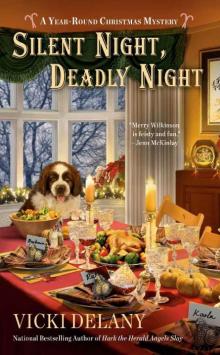 Silent Night, Deadly Night
Silent Night, Deadly Night Coral Reef Views
Coral Reef Views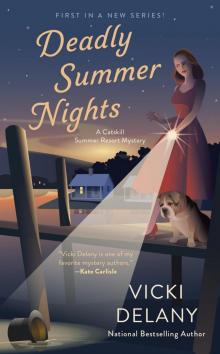 Deadly Summer Nights
Deadly Summer Nights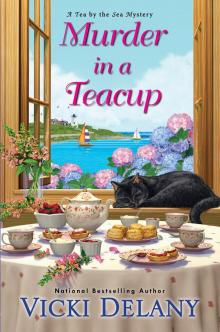 Murder in a Teacup
Murder in a Teacup Whiteout
Whiteout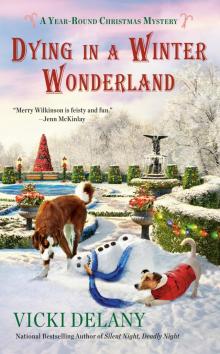 Dying in a Winter Wonderland
Dying in a Winter Wonderland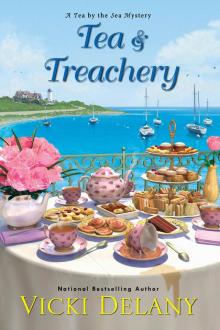 Tea & Treachery
Tea & Treachery Rest Ye Murdered Gentlemen
Rest Ye Murdered Gentlemen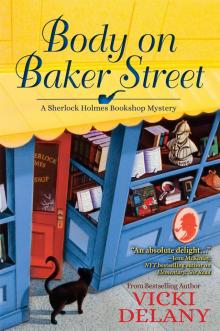 Body on Baker Street: A Sherlock Holmes Bookshop Mystery
Body on Baker Street: A Sherlock Holmes Bookshop Mystery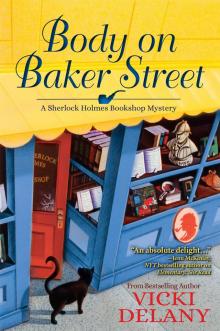 Body on Baker Street
Body on Baker Street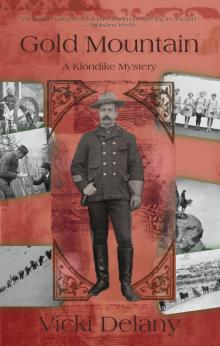 Gold Mountain
Gold Mountain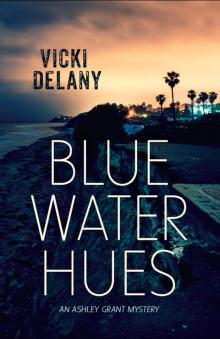 Blue Water Hues
Blue Water Hues Hark the Herald Angels Slay
Hark the Herald Angels Slay Murder at Lost Dog Lake
Murder at Lost Dog Lake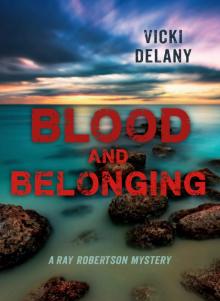 Blood and Belonging
Blood and Belonging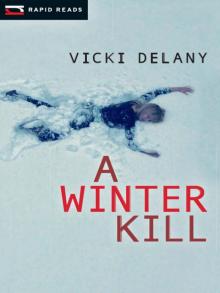 A Winter Kill
A Winter Kill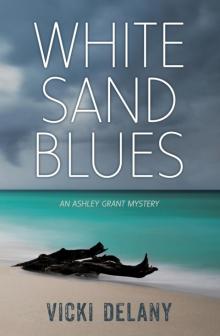 White Sand Blues
White Sand Blues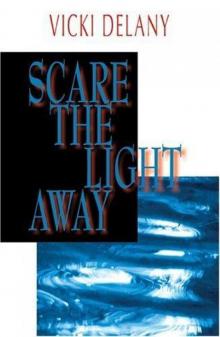 Scare the Light Away
Scare the Light Away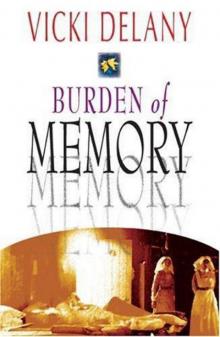 Burden of Memory
Burden of Memory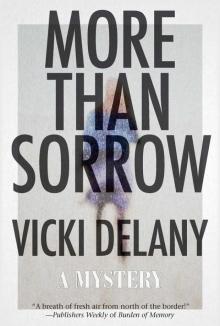 More Than Sorrow
More Than Sorrow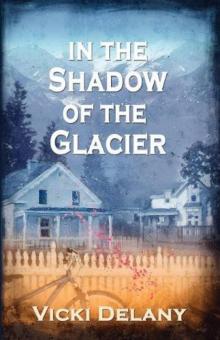 In the Shadow of the Glacier
In the Shadow of the Glacier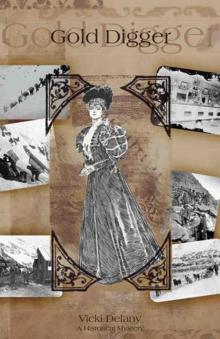 Gold Digger: A Klondike Mystery
Gold Digger: A Klondike Mystery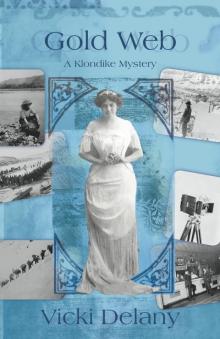 Gold Web
Gold Web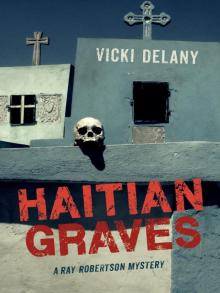 Haitian Graves
Haitian Graves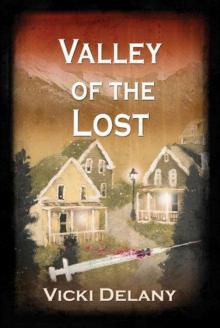 Valley of the Lost
Valley of the Lost We Wish You a Murderous Christmas
We Wish You a Murderous Christmas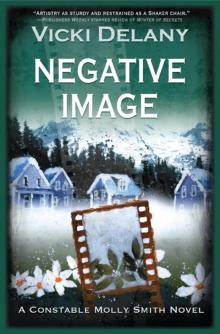 Negative Image
Negative Image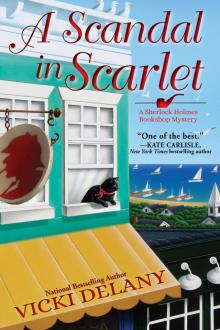 A Scandal in Scarlet
A Scandal in Scarlet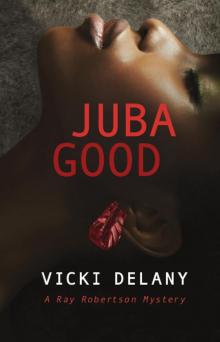 Juba Good
Juba Good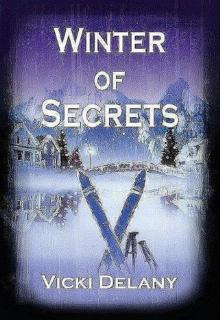 Winter of Secrets
Winter of Secrets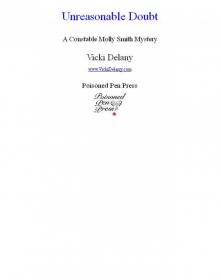 Unreasonable Doubt
Unreasonable Doubt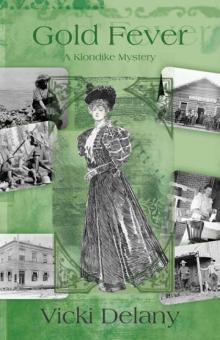 Gold Fever
Gold Fever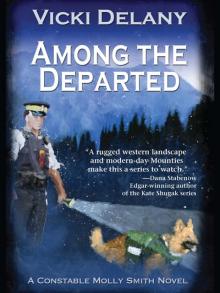 Among the Departed
Among the Departed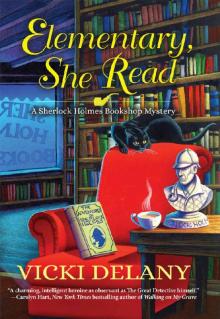 Elementary, She Read: A Sherlock Holmes Bookshop Mystery
Elementary, She Read: A Sherlock Holmes Bookshop Mystery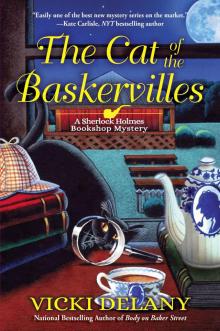 The Cat of the Baskervilles
The Cat of the Baskervilles